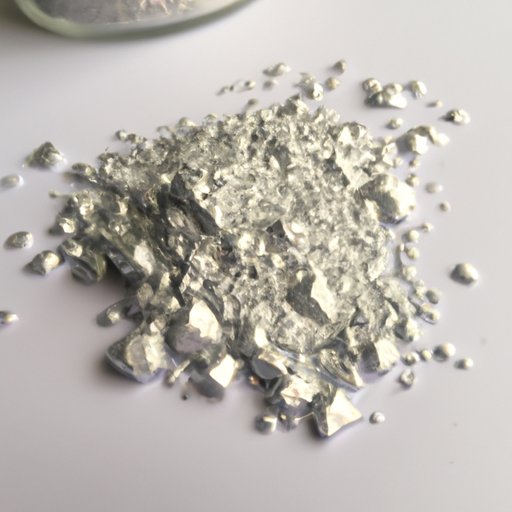Introduction
Aluminum chloride (AlCl3) is an important compound used in various industries and applications. Its solubility—or the amount of a substance that can be dissolved in a solution—is an important property to consider when utilizing it. In this article, we’ll explore the solubility of aluminum chloride, examining factors that affect it, how it dissolves in different solutions, and its applications. We’ll also compare the solubility of aluminum chloride to other compounds.
Investigating Factors that Affect Aluminum Chloride Solubility
The solubility of aluminum chloride is affected by several factors, including temperature, pH, and concentration. Let’s take a closer look at each of these factors.
Temperature
As with most compounds, the solubility of aluminum chloride increases as the temperature of the solution increases. At 25°C, aluminum chloride is only slightly soluble in water, but at higher temperatures, its solubility increases significantly. For example, at 100°C, the solubility of aluminum chloride in water is around 65g/100mL.
pH
The pH of the solution also affects the solubility of aluminum chloride. Aluminum chloride is more soluble in acidic solutions than in basic solutions, with the highest solubility occurring at pH values between 1 and 4. As the pH of the solution increases, the solubility of aluminum chloride decreases.
Concentration
The concentration of aluminum chloride in a solution also affects its solubility. The higher the concentration, the lower the solubility. This means that if you have a solution with a high concentration of aluminum chloride, adding more of the compound will not increase its solubility.

Examining How Aluminum Chloride Dissolves in Different Solutions
Aluminum chloride has different solubilities in different solutions. Let’s take a look at how it behaves in water, acids, and bases.
Water
As mentioned previously, aluminum chloride is only slightly soluble in water at room temperature. However, its solubility increases significantly at higher temperatures. At 100°C, the solubility of aluminum chloride in water is around 65g/100mL.
Acids
Aluminum chloride is highly soluble in acids. For example, it is completely soluble in hydrochloric acid, with a solubility of about 160g/100mL. It is also highly soluble in nitric acid and sulfuric acid.
Bases
Aluminum chloride is less soluble in bases compared to acids. For example, in sodium hydroxide, which is a strong base, the solubility of aluminum chloride is around 2.5g/100mL. This is significantly lower than its solubility in acids.

Comparing the Solubility of Aluminum Chloride to Other Compounds
We can compare the solubility of aluminum chloride to other compounds to get a better understanding of its behavior. Let’s take a look at a few examples.
Sodium Chloride
Sodium chloride (NaCl) is highly soluble in water, with a solubility of around 35g/100mL at 25°C. This is much higher than the solubility of aluminum chloride in water, which is only slightly soluble at 25°C.
Potassium Chloride
Potassium chloride (KCl) is also highly soluble in water, with a solubility of around 52g/100mL at 25°C. This is significantly higher than the solubility of aluminum chloride in water.
Magnesium Chloride
Magnesium chloride (MgCl2) is only slightly soluble in water, with a solubility of around 0.2g/100mL at 25°C. This is similar to the solubility of aluminum chloride in water, which is also only slightly soluble at 25°C.

Exploring the Applications of Aluminum Chloride Solutions
Aluminum chloride solutions are used in a variety of industries and applications. Let’s take a look at some of the most common uses.
Industrial Uses
Aluminum chloride solutions are commonly used in industrial processes, such as electroplating, water treatment, and metal finishing. They are also used as catalysts or initiators in chemical reactions.
Pharmaceutical Uses
Aluminum chloride solutions are used in the pharmaceutical industry as antacids and antidiarrheals. They are also used as astringents to treat skin conditions, such as acne.
Food and Beverage Uses
Aluminum chloride solutions are used in the food and beverage industry as preservatives and clarifying agents. They are also used to improve the flavor of beer, wine, and other alcoholic beverages.
Conclusion
In conclusion, aluminum chloride is a widely used compound with many applications. Its solubility is affected by several factors, including temperature, pH, and concentration. Aluminum chloride is more soluble in acids than in bases, and its solubility is lower than that of other compounds, such as sodium chloride and potassium chloride. Aluminum chloride solutions are used in a variety of industries and applications, including the industrial, pharmaceutical, and food and beverage industries.

